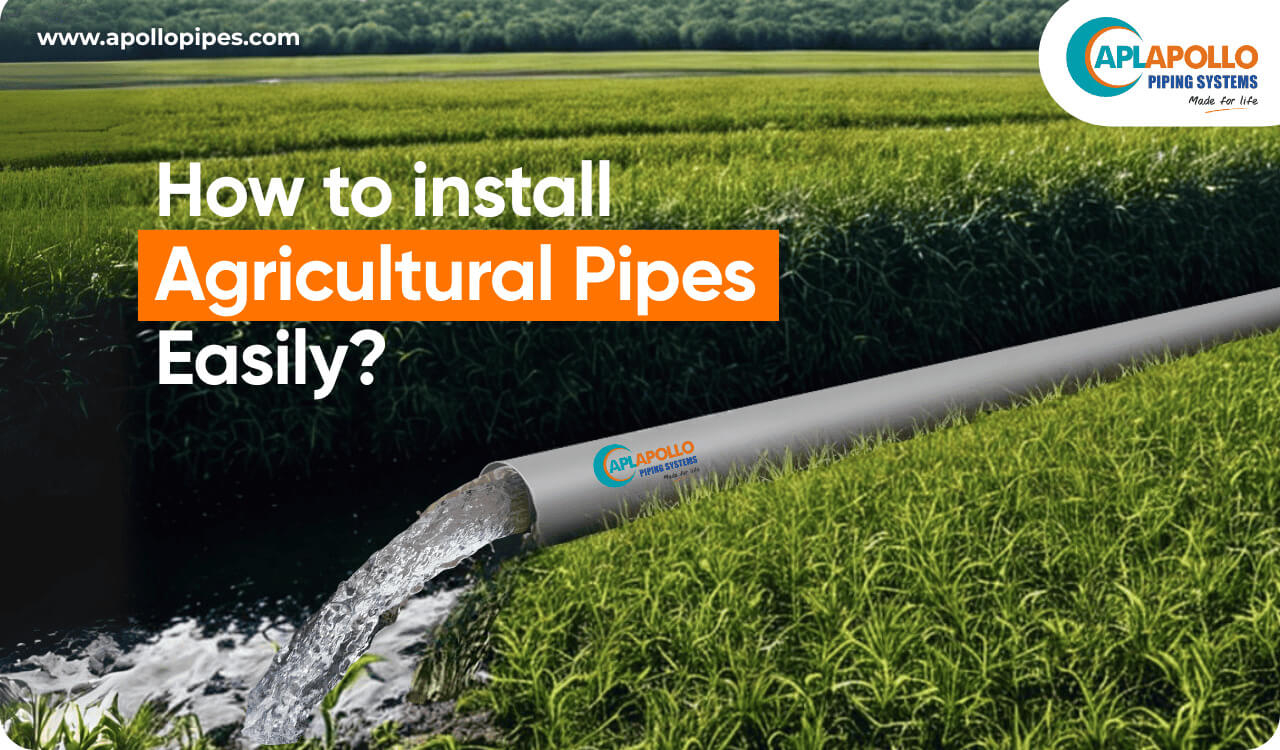Agricultural pipes are essential for the agriculture sector, as this helps deliver water to crops, gardens, and fields. Installing agriculture pipes properly ensures good performance and long-term durability. If you properly install these pipes, it saves not only time but money also.
You can install the agricultural pipes easily by going through the following points:
- Plan the Irrigation Layout
Before purchasing agriculture pipes, you need to plan the layout carefully. Think over the route of the pipes, the number of outlets, and the type of irrigation method you are going to use. These methods include drip irrigation, sprinkler systems, or flood irrigation. Take the measurement of the field to know the total length of pipes needed. Now know the water source's location, such as a canal, water tank, or borewell, etc., and also mark spots for main lines and branch lines. If you carefully plan the layout, it will help you in many ways.
- Choosing the Right Agriculture Pipes
Choosing the correct type of agriculture pipes is very important for smooth installation. There are various kinds of options available in the market that are PVC pipes, HDPE pipes, LDPE pipes, etc. While choosing agriculture pipes, consider the diameter of the pipes. As larger diameters are suitable for main water supply lines, smaller diameters are suitable for distribution lines. Also consider the pressure ratings and choose pipes that can handle the water pressure of your system. Always buy the pipes that are UV resistant, as these agricultural pipes get exposed to sunlight.
Clear the area where you want to install the agricultural pipes. If there are stones, weeds, and debris, remove them. Level the ground to prevent uneven water flow. If you are installing the pipes underground, you need to dig trenches according to the diameter of your pipe. If you are installing the pipes aboveground, ensure the surface is free from sharp objects to prevent the pipe from being damaged.
- Cutting and Connecting the Pipes
Pipes need to be cut to the required lengths using a pipe cutter. For leak-free joints, cut the pipes straight. Using proper fittings like couplers, elbows, etc., join the pipe and check the alignment.
- Install Valves and Filters
Agriculture pipes work best when equipped with control systems. If you want to regulate water flow, you need to have a main valve. Similarly, filters prevent blockages caused by dirt, and they are important in drip irrigation systems. Installing pressure regulation is also important to ensure the water flow remains consistent. If you install these components at the right points, you will get increased efficiency and an extended lifespan of your agriculture pipes.
If you install underground, place the pipes into the trenches and cover them with soil, and in this process, it is to be ensured that there are no sharp stones that can damage them. For above-ground installations, you can use clamps to keep them in place. It is to be ensured that the pipes laid on slopes are tightly secured to prevent movement during water flow.
Before regular use, it is better to run water through the pipes to check for leakage or pressure drops. If you find any kind of leakage, tighten the fittings or change faulty parts. Make sure all outlets deliver water evenly across the field.
- Maintaining Agriculture Pipes
Once you install your agricultural pipes, you need to maintain them for long-lasting. It is a good idea to check for cracks or leaks after a period. Clean filters to maintain smooth water flow. You can drain water from the pipes before winter or during long periods of non-use. While making a buying decision, it is essential to choose the pipes that are made of UV-resistant material to prevent the effect of excessive sunlight. By doing it you can increase the life span of these pipes.
APL Apollo Agriculture Piping System
APL Apollo’s agriculture piping system is the best solution for all your water supply and irrigation-related requirements. These PVC pipes are available in different sizes and pressure classes. Manufactured using high-quality material and standards, these pipes have become a popular choice for agriculture and other sectors related to water supply. These pipes have been ruling the domain for many decades. APL Apollo’s agriculture pipes are ISI certified as evidence of their superior quality. As these pipes are lightweight, it is very easy to install them. These pipes and fittings are a boon for the agricultural sector.


